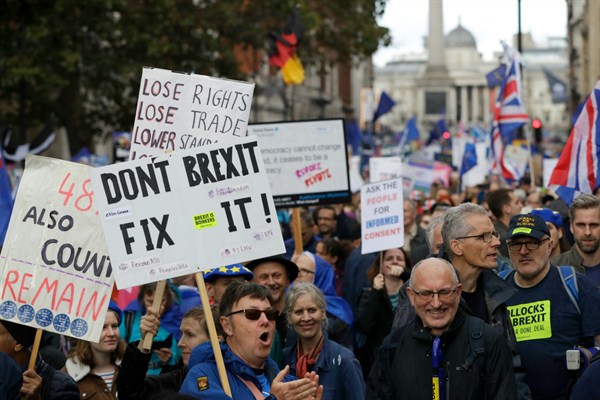Despite saying that he would “rather be dead in a ditch” than delay Brexit, British Prime Minister Boris Johnson was forced to do just that late Saturday night, sending a letter to the European Commission requesting another extension for the United Kingdom’s long-awaited departure from the European Union. As with two earlier delays, the core challenges to resolving Brexit remain avoiding a highly disruptive, “no-deal” exit; keeping the Irish land border open; and defining trade relationships with the EU and the rest of the world that mitigate the costs of leaving the world’s largest customs union.
The British Parliament refused a clean vote on Johnson’s Brexit deal Saturday because its priority is to ensure the U.K. will not “crash out” of the EU without a deal. The problem is that a majority of members of Parliament do not trust Johnson to deliver that outcome. The failure of his government’s push to gain approval for the deal was sealed by the loss of crucial votes from Northern Ireland’s Democratic Unionist Party, on whose support the Conservatives depend, since they lack a parliamentary majority. Those DUP members do not like how the renegotiated Brexit deal addresses the Irish border. One benefit of all this continued uncertainty, however, is that it has provided a glimpse into what an independent British trade policy might look like.
Johnson’s predecessor as prime minister, Theresa May, stepped aside after Parliament voted down her Brexit deal three times. Johnson came in emphasizing his determination to leave the EU by the Oct. 31 deadline, even if there was no deal in place. He then tried to suspend Parliament for an unusually long five weeks in the midst of the Brexit debate, but was overruled by Britain’s Supreme Court. Parliament responded to Johnson’s attempt to sideline it by approving what is known as the Benn Act, which required the government to either have a deal approved by Oct. 19 or ask the EU for three more months to iron things out.

